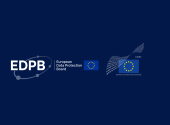
EDPS strengthens DPO role
New guidance and binding rules to protect DPO independence across EU institutions.

New guidance and binding rules to protect DPO independence across EU institutions.

On 12 February 2026, the European Data Protection Supervisor (EDPS) and the European Data Protection Board (EDPB) Trainees organise the conference Data takes flight: Navigating privacy at the airport. The conference will raise awareness about what happens to personal data when traveling by air and encourage a critical and informed discussion about data protection, security, and the usage of personal data in this context.

EDPB and EDPS support simplification and competitiveness while raising key concerns. On 10 February 2026, the Joint Opinion on the Proposal for a Regulation as regards the simplification of the digital legislative framework (Digital Omnibus) was adopted.

Every year on 28 January, we celebrate Data Protection Day. This date marks the anniversary of the Council of Europe’s Convention 108, the first binding international law securing individuals' rights to protection of their personal data.

The digital regulatory landscape now extends beyond data protection, consumer protection and competition law. In response to rapid technological and regulatory developments, the EDPS invites you to discuss the future of cross-regulatory cooperation.
Effective cross-regulatory cooperation is necessary to ensure consistent application of recent laws such as the Data Governance Act, Digital Markets Act, Digital Services Act, Data Act, and Artificial Intelligence Act - each of which highlight the critical role of personal data in the digital economy and the need to protect individuals. The EDPS proposes a Digital Clearinghouse 2.0 to provide competent authorities with a forum to exchange and coordinate on issues of common interest.
When: 27 January 2026
Where: European Commission, Charlemagne building, Brussels

EDPB and EDPS support streamlining AI Act implementation but call for stronger safeguards to protect fundamental rights.

In this podcast series we are observing 6 AI trends from the TechSonar 2025-2026: covering agentic AI, AI companions, automated proctoring, AI-driven personalised learning, coding assistants, and confidential computing.

Read the blogpost on audits in practice: a predictable and proportionate tool supporting compliance, risk management and trust across EU institutions.

Read the Press Release on the EDPS' support of the targeted VAT data access to fight fraud at EU level, while warning against blurring administrative and criminal boundaries.

With Christmas and a new year just around the corner, there is still time for one more catch-up on all things European data protection. In this issue, we have: horizon-scanning releases looking at emerging tech, a look at recent international meetings between data protection authorities, and privacy-focused events to kick off your 2026.